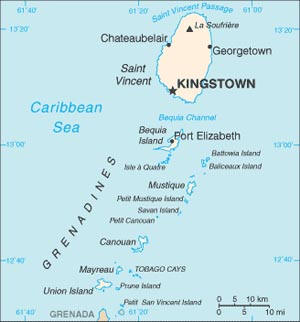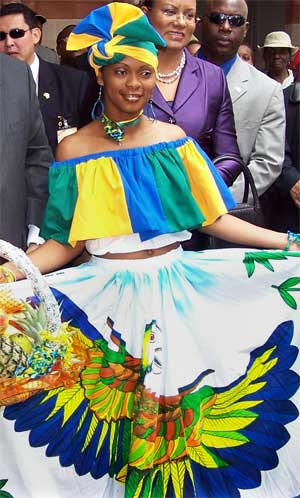|
Caribbean Offshore Banking FAQ - Corporate Bank account - Personal Bank account - Information about Saint Vincent - Order Service/Contact us - Free Debit Card Paypal Solution - Other Offshore financial resources -
Saint Vincent and the Grenadines
A bit of information about St Vincent & The Grenadines
Saint Vincent and the Grenadines is an independent nation that is well
known for its democratic system of Government. Elections are held every
five years.
Detail map Saint Vincent
In 1996, the government of St. Vincent and the Grenadines created the new International Financial Services Authority and enacted a set of laws that not only reflect the best elements of modern international legislation, but also accept the reality of today's information technology.
Geography
Terrain: Volcanic
and mountainous, with the highest peak, Soufriere,
rising to 1,219 meters (4,000 ft.). Climate: Tropical.
People
Nationality:
Noun and adjective--Vincentian.
Government
Economy
PEOPLE
HISTORY Slavery was abolished in 1834; the resulting labor shortages on the plantations attracted Portuguese immigrants in the 1840s and east Indians in the 1860s. Conditions remained harsh for both former slaves and immigrant agricultural workers, as depressed world sugar prices kept the economy stagnant until the turn of the century. From 1763 until independence, St. Vincent passed through various stages of colonial status under the British. A representative assembly was authorized in 1776, Crown Colony government installed in 1877, a legislative council created in 1925, and universal adult suffrage granted in 1951. During this period, the British made several unsuccessful attempts to affiliate St. Vincent with other Windward Islands in order to govern the region through a unified administration. The most notable was the West Indies Federation, which collapsed in 1962. St. Vincent was granted associate statehood status in 1969, giving it complete control over its internal affairs. Following a referendum in 1979, St. Vincent and the Grenadines became the last of the Windward Islands to gain independence. Natural disasters have plagued the country throughout the 20th century. In 1902, the La Soufriere volcano erupted, killing 2,000 people. Much farmland was damaged, and the economy deteriorated. In April 1979, La Soufriere erupted again. Although no one was killed, thousands had to be evacuated, and there was extensive agricultural damage. In 1980 and 1987, hurricanes devastated banana and coconut plantations; 1998 and 1999 also saw very active hurricane seasons, with Hurricane Lenny in 1999 causing extensive damage to the west coast of the island.
GOVERNMENT The parliament is a unicameral body, consisting of 15 elected members and six appointed senators. The governor general appoints senators, four on the advice of the prime minister and two on the advice of the leader of the opposition. The parliamentary term of office is five years, although the prime minister may call elections at any time. As in other English-speaking Caribbean countries, the judiciary in St. Vincent is rooted in British common law. There are 11 courts in three magisterial districts. The Eastern Caribbean Supreme Court, comprising a High Court and a Court of Appeals, is known in St. Vincent as the St. Vincent and the Grenadines Supreme Court. The court of last resort is the judicial committee of Her Majesty's Privy Council in London. There is no local government in St. Vincent, and all six parishes are administered by the central government.
Principal
Government Officials St. Vincent and the Grenadines maintains an embassy at 3216 New Mexico Ave., NW, Washington, DC 20016 (tel. 202-364-6730). St. Vincent also has a consul resident in New York.
POLITICAL
CONDITIONS Founded in 1955, the St. Vincent Labour Party (SVLP), under R. Milton Cato, gained the support of the middle class. With a conservative law-and-order message and a pro-Western foreign policy, the SVLP dominated politics from the mid-1960s until the mid-1980s. Following victories in the 1967 and 1974 elections, the SVLP led the island to independence, winning the first post-independence election in 1979. Expecting an easy victory for the SVLP in 1984, Cato called early elections. The results were surprising: with a record 89% voter turnout, James F. Mitchell's New Democratic Party (NDP) won nine seats in the House of Assembly. Bolstered by a resurgent economy in the mid-1980s, Mitchell led his party to an unprecedented sweep of all 15 House of Assembly seats in the 1989 elections. The opposition emerged from the election weakened and fragmented but was able to win three seats during the February 1994 elections under a "unity" coalition. In 1998, Prime Minister Mitchell and the NDP were returned to power for an unprecedented fourth term but only with a slim margin of 8 seats to 7 seats for the Unity Labour Party (ULP). The NDP was able to accomplish a return to power while receiving a lesser share of the popular vote, approximately 45% to the ULP's 55%. In March 2001, the ULP, led by Ralph Gonsalves, assumed power after winning 12 of the 15 seats in Parliament. In the December 2005 parliamentary elections, Prime Minister Gonsalves and the ULP retained their 12-3 majority over the NDP.
ECONOMY In contrast to developments on the main island, tourism in the Grenadines has grown to become a very important part of the economy, and the chief earner of foreign exchange for the country as a whole. The Grenadines have become a favorite of high-end tourism and the focus of new development in the country. Super-luxury resorts, yachting tourism, and a commitment by the government to rehabilitate and protect the Tobago Keys as a national park have all contributed to strong tourism returns in the Grenadines. St. Vincent and the Grenadines' currency is the Eastern Caribbean Dollar (EC$), a regional currency shared among members of the Eastern Caribbean Currency Union (ECCU). The Eastern Caribbean Central Bank (ECCB) issues the EC$, manages monetary policy, and regulates and supervises commercial banking activities in its member countries. The ECCB has kept the EC$ pegged at EC$2.7=U.S. $1. St. Vincent and the Grenadines is a beneficiary of the U.S. Caribbean Basin Initiative that grants duty-free entry into the United States for many goods. St. Vincent and the Grenadines also belongs to the predominantly English-speaking Caribbean Community and Common Market (CARICOM) and the CARICOM Single Market and Economy (CSME).
FOREIGN
RELATIONS
U.S.-ST.
VINCENT RELATIONS The United States supports the Government of St. Vincent and the Grenadines' efforts to expand its economic base and to provide a higher standard of living for its citizens. U.S. assistance is channeled primarily through multilateral agencies such as the World Bank. The U.S. military also provides assistance through construction and humanitarian civic action projects. A relatively small number of Americans--fewer than 1,000--reside on the islands. The United States maintains no official presence in St. Vincent. The Ambassador and Embassy officers are resident in Barbados and frequently travel to St. Vincent.
Principal
U.S. Embassy Officials The
U.S. Embassy in Barbados is located in the
Wildey Business Park, Wildey, St. Michael (tel:
246-436-4950; fax: 246-429-5246). Other
Contact Information Caribbean/Latin
American Action The U.S. Department of State's Consular Information Program advises Americans traveling and residing abroad through Country Specific Information, Travel Alerts, and Travel Warnings. Country Specific Information exists for all countries and includes information on entry and exit requirements, currency regulations, health conditions, safety and security, crime, political disturbances, and the addresses of the U.S. embassies and consulates abroad. Travel Alerts are issued to disseminate information quickly about terrorist threats and other relatively short-term conditions overseas that pose significant risks to the security of American travelers. Travel Warnings are issued when the State Department recommends that Americans avoid travel to a certain country because the situation is dangerous or unstable. For the latest security information, Americans living and traveling abroad should regularly monitor the Department's Bureau of Consular Affairs Internet web site at http://www.travel.state.gov, where the current Worldwide Caution, Travel Alerts, and Travel Warnings can be found. Consular Affairs Publications, which contain information on obtaining passports and planning a safe trip abroad, are also available at http://www.travel.state.gov. For additional information on international travel, see http://www.usa.gov/Citizen/Topics/Travel/International.shtml. The Department of State encourages all U.S. citizens traveling or residing abroad to register via the State Department's travel registration website or at the nearest U.S. embassy or consulate abroad. Registration will make your presence and whereabouts known in case it is necessary to contact you in an emergency and will enable you to receive up-to-date information on security conditions. Emergency information concerning Americans traveling abroad may be obtained by calling 1-888-407-4747 toll free in the U.S. and Canada or the regular toll line 1-202-501-4444 for callers outside the U.S. and Canada. The National Passport Information Center (NPIC) is the U.S. Department of State's single, centralized public contact center for U.S. passport information. Telephone: 1-877-4-USA-PPT (1-877-487-2778); TDD/TTY: 1-888-874-7793. Passport information is available 24 hours, 7 days a week. You may speak with a representative Monday-Friday, 8 a.m. to 10 p.m., Eastern Time, excluding federal holidays. Travelers can check the latest health information with the U.S. Centers for Disease Control and Prevention in Atlanta, Georgia. A hotline at 800-CDC-INFO (800-232-4636) and a web site at http://wwwn.cdc.gov/travel/default.aspx give the most recent health advisories, immunization recommendations or requirements, and advice on food and drinking water safety for regions and countries. The CDC publication "Health Information for International Travel" can be found at http://wwwn.cdc.gov/travel/contentYellowBook.aspx.
Source:
http://www.state.gov/r/pa/ei/bgn/2345.htm
Caribbean Offshore Banking FAQ - Corporate Bank account - Personal Bank account - Information about Saint Vincent - Order Service/Contact us - Free Debit Card Paypal Solution - Other Offshore financial resources -
Informacion sobre cuenta bancaria en San Vicente Cuenta Bancaria offshore con tarjeta ATM en San Vicente - Caribe
Características de la cuenta bancaria offshore Razones para abrir una cuenta bancaria offshore San Vicente y las Granadinas Banca Offshore Guía para abrir su propia cuenta bancaria en San Vicente - Caribe Wiki informacion sobre San Vicente y Las Granadinas - Caribe
Cargos y tarifas de la Cuenta Bancaria
|
||||||||||||||||||||||||||||
|
|
|||||||||||||||||||||||||||||
|
|
|||||||||||||||||||||||||||||
|
|
|||||||||||||||||||||||||||||
| Privacy Policy for www.listofbanksin.com | |||||||||||||||||||||||||||||

|




